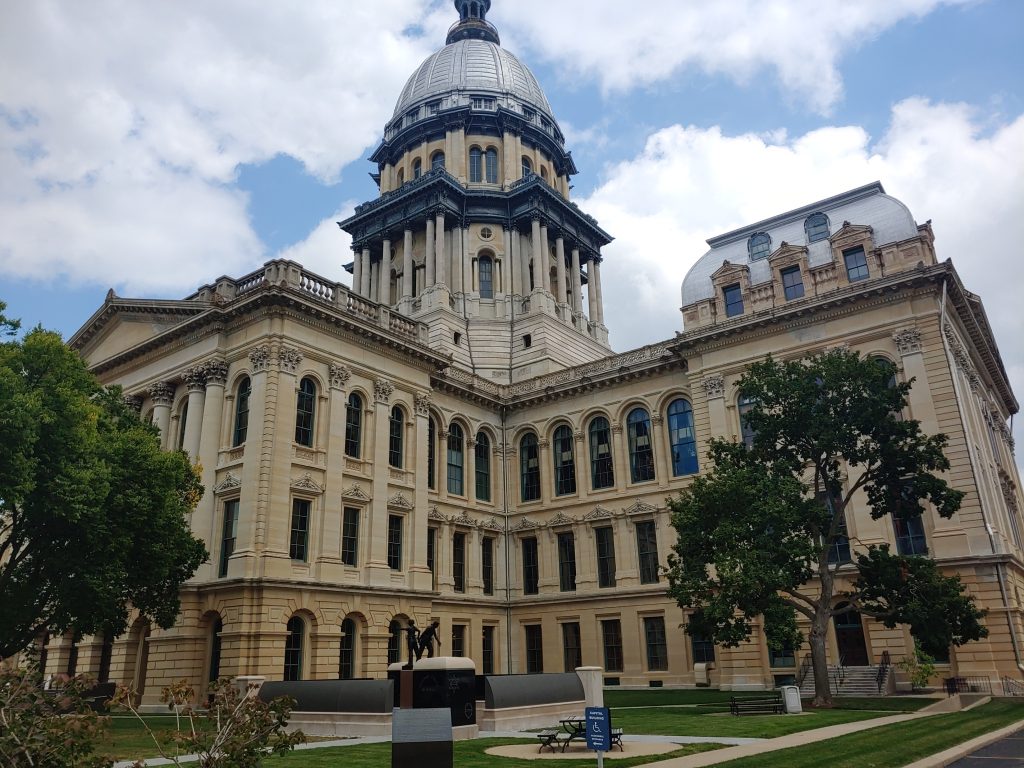MADIGAN TRIAL
Corruption trial of Speaker Madigan draws in convicted former Rep. Eddie Acevedo. Former Chicago Democratic State Rep. Eddie Acevedo, already sentenced to prison on separate charges of tax evasion, has been ordered to the witness stand in the Madigan corruption trial. Prosecutors assert that the longtime legislator was familiar with many of former Speaker Madigan’s clout-heavy maneuverings.

As a senior member of the Illinois House, Acevedo could help the former Speaker pass or block Illinois laws up for debate, and the prosecution team says Madigan and his inner circle used powers like these to peddle influence and advance the interests of Madigan’s private-practice law firm. In addition, clout interactions like these appear to have led to direct payments of money. The U.S. Attorney’s office has already presented evidence in court to show that, in 2017, AT&T Illinois gave Acevedo a no-work contract and frequent “work-related” payments. The payments coincided with AT&T achieving passage of a major business-friendly, consumer-unfriendly state law that altered the terms of AT&T’s statewide customer service franchise and duties to customers.
It is not known when Acevedo will testify in the Madigan trial, as the structure of his questioning has not yet been finalized. The prosecution team is signaling, however, that they expect Acevedo’s testimony could be among the last elements they will present to the jury as they seek to wrap up their case against the former Illinois House Speaker and statewide political party boss. Longtime lobbyist and former State Rep. Mike McClain, a close Madigan ally and confidante, is also on trial in the Madigan case.
IMMIGRATION
More Than 155,000 Standard IDs and Driver’s Licenses Issued to Illinois Noncitizens in 5 Months. Since Law Went Into Effect. More than 155,000 standardized IDs and driver’s licenses for non-U.S. citizens have been issued in the five months since an Illinois law went into effect that aims to protect noncitizens from discrimination, according to numbers from the Illinois Secretary of State’s office.

The law, which went into effect in July, grants noncitizens regardless of immigration status the ability to obtain a standardized state driver’s license replacing the Temporary Visitor Driver’s License, which displayed a purple banner and the words “Not Valid For Identification.” […]
The four-year driver’s license for noncitizens features a standard red banner and replaces “Not Valid For Identification” with “Federal Limits Apply.” Noncitizens who are unable or choose not to drive also have the option to obtain a standardized ID.
Since the law went into effect, the office has issued 49,852 state IDs and 106,026 driver’s licenses for noncitizens, according to Illinois Secretary of State spokesperson Max Walczyk. Read more from WTTW.
House Bill 3882 was passed into law in 2023, with no House Republicans supporting the legislation to provide standard driver’s licenses to noncitizens.
LAW ENFORCEMENT
Rep. Miller: Rita Crundwell Sentence Commutation by The Biden Administration is a Disgrace.
United States President Joe Biden issued the largest one-day pardon action in the history of the country, commuting the sentences and pardoning more than 1500 convicted criminals. One of the individuals listed as having their sentence commuted was the infamous convicted felon and former Comptroller of the city of Dixon, Rita Crundwell. State Representative Chris Miller issued the following statement in response.
“Biden and Pritzker have disregarded the rule of law and choose to support criminals,” said Rep. Miller. “Taxpaying citizens are being hijacked by the Democrats while they protect their own people. Hunter Biden should be locked up for his crimes and Rita Crundwell needs to pay the price for stealing millions from the hard-working taxpayers of Illinois. It’s a disgrace that Democrats openly support criminals and disrespect our criminal justice system.”
Some of the commutations offered by President Biden include the lifting of required restitution and that at the time of the release of the commutation list, it was unclear if Crundwell had been relieved of her responsibility to pay back the money she stole.
Illinois Supreme Court reaffirms that smell of cannabis constitutes probable cause to search a motor vehicle. This smell-of-marijuana test had been settled law prior to the legalization of Illinois dispensary cannabis in 2019 (effective January 1, 2020). With legal cannabis, however, the standing of pre-2020 police-search case law came to be questioned, even as law enforcement violations involving Illinois motor vehicles and marijuana continue to multiply. Cannabis consumption should never go together with the act of driving a motor vehicle. Cannabis can create impaired driving and endanger other drivers, passengers, and pedestrians.
Now, the Illinois Supreme Court has reaffirmed that the smell of “raw cannabis” will continue to allow police to search a motor vehicle. The decision reaffirms that any unsmoked, raw cannabis transferred by a private citizen in a motor vehicle must be transported in an odor-proof container. The Illinois Supreme Court decision was handed down on Monday, December 9.
PENSIONS
Illinois’ unfunded pension liabilities at near-record $143.7 billion. The Commission on Government Forecasting and Accountability (CGFA), in its 2024 Special Pension Briefing, reported that Illinois’ unfunded pension liabilities totaled more than $143.7 billion at the end of Fiscal Year 2024 (June 30, 2024). This near-record figure is an increase from the equivalent $142.2 billion figure posted in the previous fiscal year and is only slightly below the all-time-record pension deficit of $144.2 billion posted in FY20.
The five State pension systems covered by the report cover the future costs of non-healthcare retirement benefits payable to vested public-sector employees in the following categories: (a) public school teachers and educators, (b) state employees, (c) employees of Illinois colleges and universities, (d) the judges of the circuit, appellate, and Supreme courts, and (e) members of the Illinois General Assembly. The $143.7 billion deficit reflects the collective unfunded pension liabilities of all five systems. The largest share (more than half of the total) is the $82.9 billion in unfunded liabilities posted by the Teachers Retirement System. TRS is the pension system that pays retirement benefits to teachers and other educational personnel in school districts throughout the state.

CGFA’s report indicates that none of these five systems have even one-half of the funds they will need to have in hand, based on generally accepted actuarial standards, to meet their future contractual obligations. The five systems are funded at ratios ranging from 46.3% (TRS), to only 24.6% for the pension system that supports retired Illinois lawmakers and legislators.
It is important to note that an “unfunded pension liability” is a forward-looking actuarial and accounting concept. It reflects the funds that each pension system actually has on hand for investment returns, to which are added an actuarially-sound estimate (based on current global economic patterns and interest rates) as to likely future investment returns; these assets are balanced against the likely total of benefits that will have to be paid out, based on future life expectancies, to current and future beneficiaries that are vested in the system. If the quantity of expected future benefits exceeds the quantity of expected future assets, the pension system must post an unfunded pension liability total. All five Illinois State-managed pension systems have made this calculation and posted these liabilities, and CGFA has compiled these five data sets to generate this week’s report.
These unfunded pension liabilities are debt-equivalent moral obligations of the State of Illinois and its taxpayers. If pension debts pile up, the State’s credit rating risks downgrades. The State of Illinois must sell debt whenever it needs to make serious investments in its roads, bridges, and other public capital infrastructure. Illinois currently has a single-A credit rating with all three major New York-based credit rating agencies, which is well below average for large public-sector debt issuers (the rating system goes up to ‘triple-AAA’) and is lower than the credit rating posted by most U.S. states.
